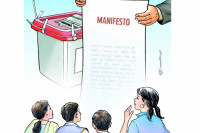National
Government eyes massive 700,000 jobs within the country
Experts say the government plan of creating jobs is neither new nor adequate to deal with the Covid-19 fallout.
Chandan Kumar Mandal
The government has prioritised job creation as unemployment is expected to see a surge as an immediate impact of the Covid-19 pandemic.
Presenting the budget for the fiscal year 2020-21 on Thursday, Finance Minister Yubaraj Khatiwada announced an ambitious plan of creating more than 700,000 jobs through various programmes.
For creating jobs, the government has been heavily counting on the Prime Minister Employment Programme (PMEP). The budget allocation for the programme, which aims to provide a minimum 100-days of waged-employment to unemployment, has been doubled to Rs11.6 billion with the aim of providing 200,000 jobs in the next year.
“Keeping in mind the fact that jobs of citizens within and outside the country have been affected due to Covid-19, the budget has been centred around generating additional jobs inside the country,” Finance Minister Yubaraj Khatiwada said.
“The required budget has been allocated to provide waged-employment to unemployed, those who lost their jobs due to Covid-19 and returnee migrant workers to mobilise them in development activities.”
The government’s focus on job creation, however, is neither new nor promising, given the extraordinary situation created by the pandemic, experts say.
“There are already various policies in place that aim to discourage foreign employment and create jobs in the country,” said Jeevan Baniya, a labour migration expert. “Several countries like Nepal, which has been outsourcing workers, have focused labour creation within the country. So the realisation is not new. It’s only that the Covid-19 situation has made it stronger.”
According to Rameshwar Nepal, a labour migration researcher and South Asia Director of Equidem Research, a UK-based human rights research organisation, the government programmes should have been more progressive looking at the current situation.
“Our constitution itself guarantees the right to employment. The government has been saying for the last three years that Nepali workers will not have to go abroad for work within five years. The proposed programmes are not even adequate and exclusive for normal situations, let alone when we are confronting a pandemic.”
Experts say the expected outcomes cannot be achieved without internalising lessons from the previous years.
“We have seen the PMEP could only provide only a few days of works. People were seen doing trivial works like plucking weeds and gardening. Even for getting those jobs, there were huge administrative hassles,” said Nepal. “While the government’s plans for generating jobs in the country is a welcome one, we cannot expect different results if we don’t learn from past experiences.”
The target set by the government would be enough to employ the unemployed citizens based in the country, where an estimated 500,000 workforce enter the market every year. It does not offer any support to the returnee migrant workers.
As many people who were rendered jobless due to the Covid-19 crisis are unlikely to remain unemployed for a long stretch, the government has planned to divert them in other areas by offering them various skill trainings in the fields of handicraft, plumbing and construction, among others.
The government has earmarked Rs 1 billion to organise these skill trainings for at least 50,000 people at the province and central level.
Likewise, Rs4.34 billion has been allotted for strengthening organisations providing technical, vocational and skill training to employ 75,000 people, including those from the informal labour sector and returnee migrant workers.
The government has also announced a plan of employing 50,000 people in the private sector. For this, the government has announced a subsidy to private firms and businesses for hiring the state-trained workers for two years.
Besides, the government has also set the target of offering self-employment, farming and business opportunities to 179,000 people through Youth and Small Entrepreneur Self Employment Fund and various other loan schemes and programmes.
According to Baniya, proposed plans and programmes can be beneficial for immediate relief and recovery, but the sustainability of such schemes remains a challenge for they cannot provide long-term employment and decent wages.
“We have to mention who are the targeted beneficiaries clearly and also ensure decent living wages,” said Baniya, who is also the assistant director at the Centre for the Study of Labour and Mobility, a think tank. “The PMEP, despite having targeted groups, could not be effective. Lower minimum wages might fail to attract workers.”
Baniya further urged that the government also need to ensure that such opportunities need to be at the local level, or else people will once again be forced to migrate to city areas or outside the country for jobs.
Forest-based industry is another area where the government plans to create nearly 30,00 jobs. The government has also announced to mobilise Rs19billlion from the Poverty Eradication Fund to create 150,00 jobs in agriculture and micro and small industries.
The government has also said soft-loans for new businesses will be provided in an easy manner.
Minister Khatiwada said the labour permit system will also be strictly enforced to ensure more jobs for Nepali workers.
Noting the failure of past government programmes to offer regular income opportunities to the people, Nepal, the labour migration researcher, said it was crucial that the job programmes are sustained and well managed this time.
“If these plans fail again like in the past, then life and livelihood of thousands of Nepali will fail,” he warned.




 9.12°C Kathmandu
9.12°C Kathmandu















